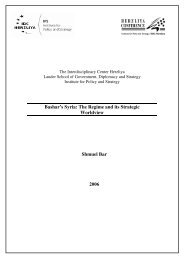Iran: Cultural Values, Self images and Negotiation Behavior
Iran: Cultural Values, Self images and Negotiation Behavior
Iran: Cultural Values, Self images and Negotiation Behavior
You also want an ePaper? Increase the reach of your titles
YUMPU automatically turns print PDFs into web optimized ePapers that Google loves.
Communication <strong>and</strong> <strong>Negotiation</strong>AmbiguityWestern diplomats <strong>and</strong> go-betweens have lamented the fact that <strong>Iran</strong>ianinterlocutors were consistent in not maintaining their promises, <strong>and</strong> that oralstatements or promises are often employed by <strong>Iran</strong>ians pro-forma, just to get aninterlocutor out of their hair, with no intention of carrying out what they have stated.The British Ambassador to <strong>Iran</strong> in the 1970s, Sir Dennis Wright, summarized hisdealings with <strong>Iran</strong>ians as follows: “The <strong>Iran</strong>ians are people who say the opposite ofwhat they think <strong>and</strong> do the opposite of what they say. That does not necessarily meanthat what they do does not conform to what they think.”Some observers claim that the popular image of <strong>Iran</strong>ian non-sincerity incommitments towards foreigners comes of the <strong>Iran</strong>ian reluctance to disappoint. 129 Asa result, an <strong>Iran</strong>ian “perhaps” or a courtesy “yes” is frequently overestimated as adefinite “yes”. 130The tendency of <strong>Iran</strong>ians to refrain from categorical refusals has been linked inpopular <strong>images</strong> to various traits: charitable observers attribute it to an ingrained socialimperative to please, or at least not to disappoint the person one is speaking with. Thisis particularly true regarding refusing a request by a guest. Those less sympatheticrelate it to a basically utilitarian approach – a commitment is kept according to thescale of the damage incurred if it is broken – or to the concept of Ketman or Taqiya asreligious <strong>and</strong> social legitimization of deception in the service of necessity or a highergood.Manners <strong>and</strong> EtiquetteOne of the most obvious aspects of <strong>Iran</strong>ian culture is the high significanceaccorded to political correctness <strong>and</strong> proper etiquette. Mehman navazi (hospitality)ranks high in the <strong>Iran</strong>ian cultural system. The all-pervasive ritual of tœ'arof has beendefined as the “active, ritualized realization of differential perceptions of superiority<strong>and</strong> inferiority in interaction.” 131 The practical results of this ritual are a clear statusranking of any ad hoc grouping in which one may infer from the acceptance orreluctance to accept favors <strong>and</strong> proposals an indication of the relative status of allparties. The terminology of the custom is replete with expressions of servitude (suchas b<strong>and</strong>eh, chaaker, novkor – e.g. slave). The ritual of tœ'arof is also extremely time-129 Haas, <strong>Iran</strong>, p. 128. According to a 19 th Century account "Readiness to please you or to concur withyou, is another peculiar trait in the <strong>Iran</strong>i's character. ... The fact is that he generally does not want todeceive you but gives you merely an evasive answer if he thinks that the truth, if told, would beunpalatable to you or savour of incivility. ..If you ask him to do a thing or fetch something for you, hewould invariably say chashm (with my eyes), but would not often move even his little finger. …Youmight as well wait till Doomsday”. Masani Sir Rustom, "With Dinshah <strong>Iran</strong>i in New <strong>Iran</strong>", Dinshah<strong>Iran</strong>i Memorial Volume,” Bombay, 1948.130 One referent pointed out his own bitter experience when he petitioned one of the top-level <strong>Iran</strong>ianleaders regarding a certain matter. The leader answered affirmatively (bālé,yes in Persian) to aquestion, which was formulated “Would his Excellency agree to…” After a few weeks, when thematter became pressing, the petitioner asked one of the senior officials how he could follow up thesubject. The official (who had participated in the meeting) asked in surprise if the leader had given hisagreement. When told that he had clearly said yes, the official laughed <strong>and</strong> said: “there are tens of waysto say bālé. When you learn the intonation of them all <strong>and</strong> their real meanings, you will have become<strong>Iran</strong>ian…”131 Beeman,. Language, Status, <strong>and</strong> Power in <strong>Iran</strong> 56.35
















